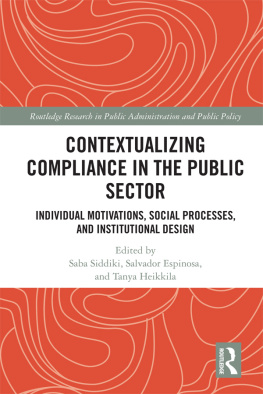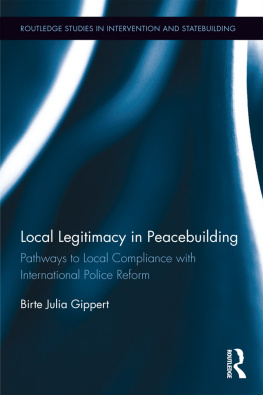Contextualizing Compliance in the Public Sector
Studying compliance to uncover whether compliance is occurring, and what motivates it, is central to the broader study of governance. Contextualizing Compliance in the Public Sector: Individual Motivations, Social Processes, and Institutional Design develops an interdisciplinary approach for answering a classic and essential question in any rule-governed context: What factors influence the decision of an individual or organization to comply (or not) with governing rules?
Analyzing compliance from an interdisciplinary and multi-level perspective, this book examines the question of what motivates compliance in the context of salient policy issues, such as energy policy, water governance, police profiling, and drug policy, among others. The book brings together an interdisciplinary group of experts who explore the psychological, social, and institutional factors that shape compliance with formal rules embodied in laws and regulations and/or informal rules embodied in social norms. In doing so, they offer a platform for assessing individual compliance, compliance by or in the context of groups, and compliance on a systemic or societal level.
Contextualizing Compliance in the Public Sector: Individual Motivations, Social Processes, and Institutional Design is an excellent resource for researchers and scholars of public administration and public policy conducting research on compliance, rules, behavior, and policy outcomes.
Saba Siddiki is Assistant Professor in the Maxwell School of Citizenship and Public Affairs at Syracuse University. Her research expertise is in policy design, collaborative policymaking, and sustainability related technology and behavior adoption. She has studied the design and associated outcomes of public policies used in food systems and environmental governance. Within these domains, she has also studied the role of multi-stakeholder collaboration in policy design and implementation.
Salvador Espinosa is Associate Professor of Public Affairs at San Diego State University. He specializes in public financial administration, public policy analysis, and institutional analysis. Dr. Espinosas current research agenda applies theories and methods from the cognitive and behavioral sciences to improve the effectiveness of regulations and public policy outcomes.
Tanya Heikkila is Professor and Associate Dean for Faculty Affairs at the University of Colorado Denver. Her research expertise is in comparative institutional analysis and the management of collaboration and conflict around common pool resources. She has studied institutions for coordinating groundwater and surface water in the western United States, interstate water conflicts and cooperation, the organization of collaborative ecosystem restoration programs, as well as the political landscape of hydraulic fracturing in the United States.
Routledge Research in Public Administration and Public Policy
Environmental Justice through Research-Based Decision-Making
William M. Bowen
The Politics of Foster Care Administration in the United States
Rebecca H. Padot
Advancing Collaboration Theory
Models, Typologies, and Evidence
Edited by John C. Morris and Katrina Miller-Stevens
Anticipatory Policymaking
When Government Acts to Prevent Problems and Why It Is So Difficult
Rob A. DeLeo
Administrative Ethics and Executive Decisions
Channeling and Containing Administrative Discretion
Chad B. Newswander
Citizen Participation in the Age of Contracting
When Service Delivery Trumps Democracy
Anna A. Amirkhanyan and Kristina T. Lambright
Community Development and Public Administration Theory
Promoting Democratic Principles to Improve Communities
Edited by Ashley E. Nickels and Jason D. Rivera
Contextualizing Compliance in the Public Sector
Individual Motivations, Social Processes, and Institutional Design
Edited by Saba Siddiki, Salvador Espinosa, and Tanya Heikkila
For a full list of titles in this series, please visit www.routledge.com
First published 2019
by Routledge
711 Third Avenue, New York, NY 10017
and by Routledge
2 Park Square, Milton Park, Abingdon, Oxon, OX14 4RN
Routledge is an imprint of the Taylor & Francis Group, an informa business
2019 Taylor & Francis
The right of Saba Siddiki, Salvador Espinosa, and Tanya Heikkila to be identified as the authors of the editorial material, and of the authors for their individual chapters, has been asserted in accordance with sections 77 and 78 of the Copyright, Designs and Patents Act 1988.
All rights reserved. No part of this book may be reprinted or reproduced or utilised in any form or by any electronic, mechanical, or other means, now known or hereafter invented, including photocopying and recording, or in any information storage or retrieval system, without permission in writing from the publishers.
Trademark notice: Product or corporate names may be trademarks or registered trademarks, and are used only for identification and explanation without intent to infringe.
Library of Congress Cataloging-in-Publication Data
A catalog record for this book has been requested
ISBN: 978-1-138-55237-1 (hbk)
ISBN: 978-1-315-14814-4 (ebk)
Typeset in Times New Roman
by Apex CoVantage, LLC
Cindy Brooks Dollar is Assistant Professor in the Department of Sociology at the University of North Carolina at Greensboro. Her research focuses on crime and deviance, power inequalities, and (in)formal social control.
Joshua Chanin is Associate Professor in the School of Public Affairs at San Diego State University. His research interests include police behavior and accountability, organizational reform, and transparency in public organizations.
Cali Curley is Assistant Professor in the School of Public and Environmental Affairs at Indiana UniversityPurdue University Indianapolis. Her research interests include sustainability, energy policy, institutions, local government, and service delivery mechanisms such as co-production.
Daniel A. DeCaro is Assistant Professor at the University of Louisville in the Department of Urban and Public Affairs and the Department of Psychological and Brain Sciences. His research focuses on public participation, regulations, incentive systems, and the interdisciplinary psychology of motivation and decision making as they pertain to compliance and cooperation in governance systems.










